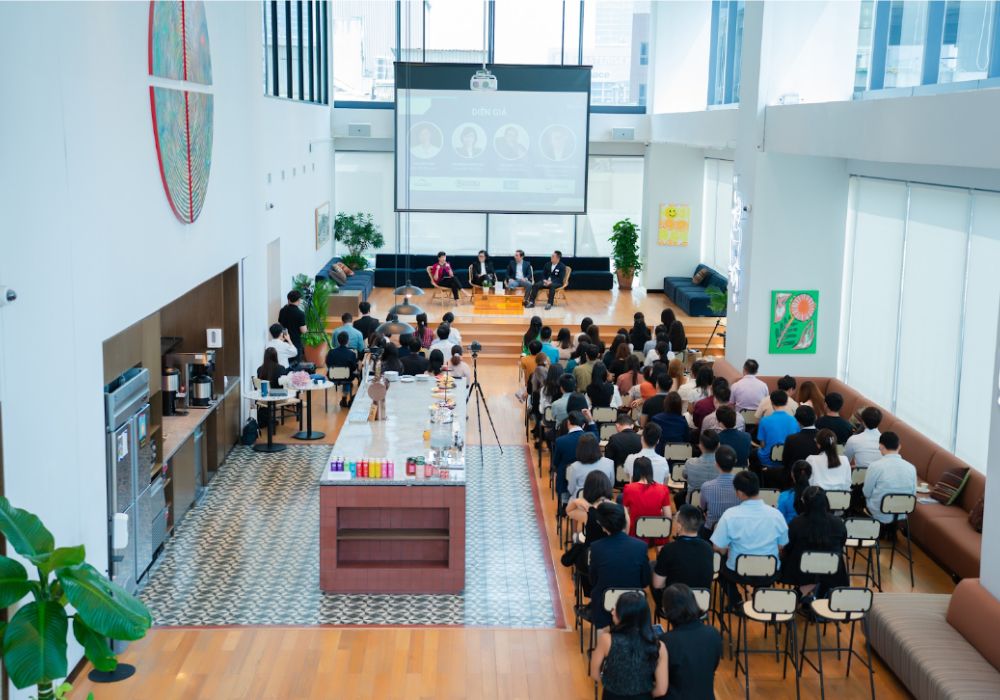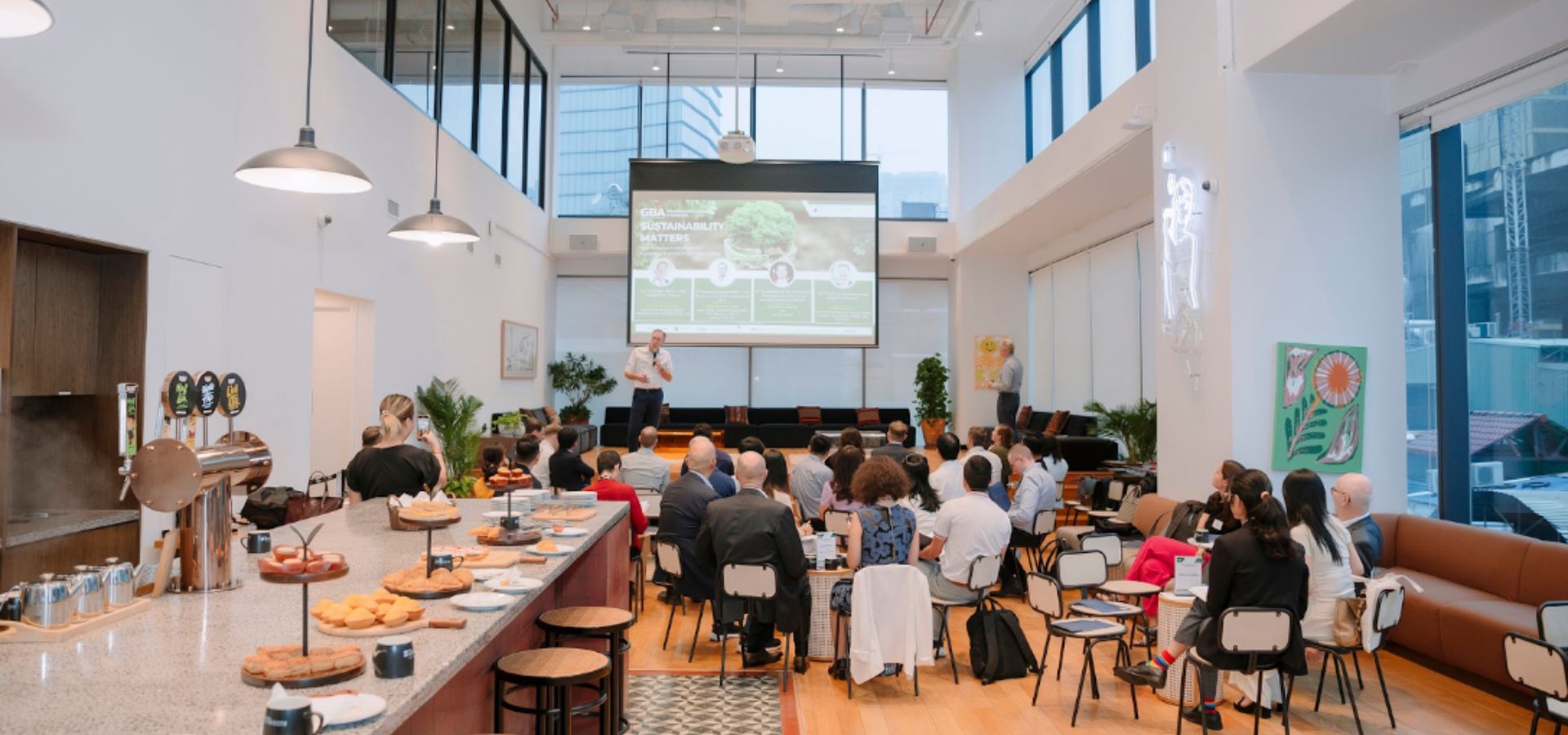What is a workshop? The secret to organizing a successful Workshop!
When people mention “workshop”, do you ever wonder what they are talking about? What is a workshop that has such strong appeal in the academic and professional community?
Imagine entering an open space – where every idea is valued, every voice is heard and every discovery brings inspiration.
A workshop is more than just a workshop or a class, it’s about interwoven interaction and learning – creating a unique and memorable learning experience.
In this article, we will explore together every aspect of the workshop in promoting creativity and knowledge exchange. Get started now!
What is a workshop?
Workshop or Seminar – is a vibrant space where experts and people interested in the same field gather to share and learn.
Here, people can interact – discuss skills, methods and in-depth knowledge in fields such as cuisine, fashion, sales, marketing… The workshop opens up opportunities to explore. and development for each participant, facilitating innovation and creativity.
A workshop is an interactive activity between a group of people with the same interest in a specific topic
What is the meaning of the workshop?
Today, workshops have become an important strategy for many organizations and businesses. Workshops not only open the door to learning and development, but also create an ideal environment for engagement, creativity and sharing – bringing great value to both individuals and organizations.
Below are the great benefits that the workshop brings:
1. Increase brand recognition at optimal costs
Workshop is a smart and cost-effective marketing strategy. From workshops, businesses can stand side by side with customers, listen and better understand their real needs through discussions and Q&A sessions.
This valuable information becomes a solid foundation for building sharp marketing strategies, targeting the exact target audience and at the same time increasing effectiveness in brand promotion.
2. Train your thinking and creativity
Workshops open up a unique space for interaction and creativity – where speakers and attendees come together to discuss and share ideas.
The combination of many different perspectives and experiences contributes to creating fertile ground for cultivating new ideas.
Furthermore, the process of finding solutions together for specific situations is not only an opportunity to challenge and expand thinking – but also helps each participant improve their creativity and problem-solving abilities. me.
3. Improve your skills
Most workshops today integrate knowledge sharing and practical application, solving specific situations.
This is a great opportunity to help participants not only accumulate knowledge, but also improve and develop many important skills for themselves, such as: creative skills, problem solving skills or working skills. the group…
4. Improve teamwork skills
During the workshop, in addition to listening to speakers and experts, participants also discussed and practiced in groups.
These connection activities help each person develop teamwork skills, find and solve challenges together. Thereby, you can practice and develop necessary skills in a modern working environment.
In addition to listening and sharing knowledge, workshop attendees can also discuss and practice with speakers/experts and other participants in a group format. These connection activities will be an opportunity for you to develop your teamwork skills and solve problems together.
5. Build relationships
Attending a workshop is not only an opportunity to learn, but also opens up many opportunities to meet and interact with participants. This helps you expand your personal network. This brings many great benefits if you are working in fields such as marketing, sales, recruitment…
Classification of workshop forms
Below are 3 commonly used workshop formats today:
1. Workshop marketing
Not only stopping at sharing specialized knowledge, marketing workshops also become a promotional stage – where organizations and businesses can introduce new products and services to a large number of customers. Therefore, special attention is paid to the organizational process of this type of workshop, aiming to convey product information in the most effective way to participants.
Marketing workshops often stand out with the following features:
- Large scale, attracting from 100 to 1000 participants.
- Meticulous and detailed preparation, with careful investment in terms of costs.
- Speakers are reputable and reputable people in the industry, including both Vietnamese and international.
- The presence of many leading experts, brand representatives, partners and target customers – creates a diverse and knowledge-rich event.
In general, a marketing workshop is a place that provides participants with valuable information about aspects of marketing. For those who are looking for a job in the marketing field – participating in the workshop will not only help expand your network of contacts, but also provide in-depth knowledge, improve your expertise and better prepare for interviews. , creating a superior competitive advantage in your career journey.
In marketing workshops, experts often share knowledge, strategies and skills in the field of marketing and advertising
2. Practical workshop
Hands-on workshops are often applied in fields such as beauty, fashion, art and cuisine. This form focuses on applying theory to practice, creating an environment for participants to try out real-life situations, thereby creating specific products or solutions.
Because of its practice-oriented nature, many businesses organize this workshop as an internal training program to improve the expertise and skills of their staff. Thereby, each participant not only learns, but also cultivates and develops through feedback and contributions from experts and colleagues. This contributes to creating a positive and creative working environment.
The knowledge sharing workshop is loved by many businesses because of its simplicity in organization. Below are the highlights of this workshop:
- Usually lasting 3-4 hours, gathering hundreds of attendees, creating a vibrant learning and exchange space.
- Organized in the form of sharing from experts and speakers on specific topics/fields. Participants not only listen but also have the opportunity to ask questions and have their questions answered – creating a rich, multi-dimensional interactive environment.
Because it focuses on sharing,beautiful discuss and interact with speakers – speakers and participants have the opportunity to learn and accumulate experience to develop themselves and enrich their knowledge base.
7-step process of organizing a professional workshop
Even though they understand what a workshop is, many people still do not know how to organize this activity and how to start. Don’t worry, refer to and apply the detailed 7-step process that The Sentry shares below:
Step 1: Determine the topic of the workshop
Determining the topic for the workshop is an important key to being able to implement it in the right direction and bring high efficiency. Workshop themes help you easily build content, shape the organization and goals of the event.
When choosing a topic, answer the following questions:
- Target: Who will participate and what will they learn?
- Workshop format: Is it sharing knowledge, practicing skills, or marketing?
- Detail goal:What problems does the workshop help solve?
- Event nature: Organized as a stand-alone event or as a series?
If you’re still confused, organize a survey or interview to gather information and gain more clarity on the topic. This is the key to the success of the workshop.
Step 2: Determine your budget
Budget not only determines the scale and complexity of the event, but also reflects the reputation and capacity of your organization in the eyes of partners and customers.
- For workshops, sponsorship is needed: A transparent and detailed budget will attract donors. At the same time, give them a detailed view of how funding is used.
- For workshops with profit goals: Determining your budget will help you easily predict revenue. Furthermore, you can consider the cost of organizing and whether the participation price is appropriate or not.
To determine an accurate budget, you need to make a detailed plan for all relevant costs, including:
- Venue rental costs: Choose a space suitable to the scale and requirements of the event.
- Necessary equipment: Speakers, projectors, microphones, tables and chairs… all must be carefully calculated.
- Speaker fees: Ensure fairness and appropriateness of their contributions.
- Printing and advertising: Documents, standees, posters, survey forms… need to be prepared.
- Cuisine: Drinks and snacks for speakers and attendees.
The more detailed the budget plan, the easier the accounting process and determination of necessary expenses will be. Note, you should add price quotes from service providers, to easily compare and make the right choice.
Step 3: Plan to organize the workshop
The more detailed the workshop plan, the more closely you can follow and direct the event according to the set goals. To plan an effective workshop, you need to focus on solving the following issues:
a. Objective of the workshop:
Clearly defining the goals and content is the key to deciding the communication method and activities in the workshop. For example, if the goal is to improve sales skills, the workshop should focus on providing practical value. At the same time, integrate with practical activities to solve specific sales situations.
b. Main content of the workshop:
Developing specific content for each part of the workshop is an indispensable step. For example, the structure for organizing a marketing workshop might include:
- Part 1: Share knowledge about marketing and the importance of planning.
- Part 2: Discuss the challenges in developing a marketing plan.
- Part 3: Practice marketing planning for a specific product.
Timing each part helps to strictly manage and ensure the effectiveness of the workshop.
c. Workshop location and time:
The workshop plan needs to be clear about location and time for participants:
- You should write down the specific starting time, including: hour and day/month/year.
- Regarding location, you should prioritize airy, comfortable space and support for connecting devices such as speakers, projectors, computers…
- At the same time, choose an organization time suitable for the participants. For example, if you want to reach an audience of “bartenders”, you should avoid hosting on weekends or evenings if targeting baristas.
d. Workshop organizer:
In the plan, clearly state information about the team participating in organizing the workshop, including: coordinator, technical person, time supervisor and logistics manager.
This information helps relevant people clearly understand their work for smooth coordination. From there, ensure the workshop runs smoothly and successfully.
Listing detailed tasks for each relevant department will help the Workshop run more smoothly and effectively
e. Guest list:
Please list the participating speakers/experts, including their names, positions, and the content they shared during the workshop. Besides, you need to remember:
- During the planning process, consult with relevant people to get more new and creative ideas.
- Please carefully review the content before submitting it to leadership, to demonstrate meticulousness and professionalism in your work.
- Create a detailed agenda for the workshop and share it with stakeholders in advance, helping them understand the program and best prepare.
Step 4: Build a workshop advertising strategy
Building a workshop promotion strategy is key to attracting more people’s attention and increasing your chances of participation. Especially when you organize workshops about new products or services.
To achieve success, focus on these factors:Workshop topic, time/location, speaker information, along with the value and benefits that participants will receive. In addition, you also need to determine which media channels to advertise the workshop on:website, email marketing, press PR for major events, social media or social networking platforms (Facebook, Instagram, LinkedIn, TikTok…).
Each advertising campaign needs to build specific content and clear broadcast time. At the same time, you need to monitor performance and feedback to flexibly adjust your strategy
Step 5: Prepare steps for the workshop
Careful preparation for the stages in the workshop not only helps you master the process, but also flexibly respond to unexpected situations. Here are the issues you need to focus on:
- Prepare the organizational space, from arranging tables and chairs, stage, to sound and lighting systems. This ensures everything runs as smoothly as possible and avoids any possible technical problems.
- Prepare all necessary tools for interactive activities, if the workshop involves testing new products or practical practice.
- Print necessary documents such as brochures, flyers and catalogs to provide detailed and useful information to attendees.
- Send invitations to interpreters/experts and guests.
- Prepare other support services such as: Free entrance tickets, tea breaks and snacks.
Finally, clearly divide the work to the relevant team to ensure all activities in the workshop take place as smoothly and professionally as possible.
Step 6: Organize the workshop
The first step for each workshop is to welcome experts/interpreters and guests, as well as guide them to settle down. The MC or event coordinator is responsible for leading and creating an exciting atmosphere right from the first minutes.
In addition to following the script, the leader must know how to facilitate interaction – encourage participants to discuss and share their views.
Faced with unforeseen situations, leaders need to react quickly and flexibly, ensuring workshop activities are not interrupted.
Step 7: Evaluate the achieved effectiveness
For the evaluation process to be truly transparent and accurate, you need to focus on aspects such as: the actual number of participants, their reactions and attitudes during the participation process, as well as the level of success. of related communication activities.
Through evaluation, you can discover strengths and weaknesses that need improvement. From there, adjust and improve the quality of future workshops.
Rules to follow when organizing a workshop
When organizing a workshop, compliance with the rules is very important to ensure the success and effectiveness of the event:
1. Respect each other’s views and opinions
Each opinion presented in the workshop is a unique perspective – neither right nor wrong. Please respect each other to create a healthy and rich discussion space.
2. Discuss in the spirit of sharing and learning
This workshop is a playground for intellectual collaboration – where experiences are shared from experts/speakers and attendees. Each perspective opens new doors for individual learning and development.
3. Focus on the main topic
With the limited time of the workshop, every minute that passes is precious. Make the most of your learning and avoid getting lost in side topics, so that every moment counts.
4. Adhere to the predetermined time frame
The workshops have a variety of topics, shared by experts and speakers. Therefore, pay attention to listen and discuss selectively and at the right time.
5. Build a positive environment
The workshop shares extensive knowledge with attendees. Based on the spirit of learning, select and accumulate information that is suitable for yourself. In addition, always keep an open mind to new ideas, even if they are not similar to your views.
6. Summarize and give final consensus
A successful workshop is where all questions about the topic are specifically resolved. Before ending the program, identifying and unifying knowledge between parties is an important step to ensure the achievement of program goals.
Some frequently asked questions about organizing workshops
The Sentry will answer some frequently asked questions about the workshop, helping you gain more useful knowledge about this operating model:
Where should the workshop be held?
The workshop location does not follow a fixed pattern. You can choose a large meeting room at a company, a conference hall, an event center or even a coffee shop for small workshops.
Most importantly, the space needs to be spacious, clean and fully equipped with amenities such as sound and lighting systems – creating favorable conditions for communication and connection.
How many people attend a workshop?
The workshop is not limited to the number of attendees. Scale can range from large events with thousands of people, to small seminars with only about 20-30 people. This depends on the purpose and organizational capabilities of each business.
How long does a workshop usually last?
Workshop time is quite flexible, usually lasting 2 – 4 hours. For series of workshops, it can last 1 – 2 days. In short, the organization time depends on the specific characteristics and goals of each type of workshop.
Who can attend the workshop?
A workshop will usually include two main groups:
- Speakers: Are famous experts in a specific field. They share their knowledge and skills about a topic with participants.
- Participants: Individuals who are interested and wish to expand their knowledge and improve their skills on a topic/field discussed.
In addition, some types of special workshops have the participation of sponsors, brand representatives and partners…
How are Workshops and Seminars different?
Workshop and seminar are both terms related to the exchange and sharing of knowledge between people interested in a certain topic.
However, they still have clear differences in scale, goals and ways of interaction as follows:
For Workshops:
- Scale organizations: Large scale with hundreds of participants. The organizational plan lists each content and activity in detail and provides a specific estimated budget.
- Target: Speakers share knowledge and skills about the topic. Some workshops also include hands-on activities and group interactions to help attendees gain a deeper understanding of the topic.
- Level of interaction: High interaction between speakers and attendees. This, promotes freedom of discussion, exchange of ideas and answers to questions.
For Seminars:
- Scale organizations: Small scale, only 5 – 10 participants.
- Target: Experts will express their views and share in-depth knowledge on a specific topic. However, seminars focus on theoretical presentation, with little group interaction and practice activities.
- Level of interaction: Short. Focus mainly on expert presentations and only short discussions.
Through sharing on the topic “what is a workshop”, you surely understand the nature and regulations for building and organizing a successful workshop. To experience meaningful and quality workshops, you need a professional organizer – The Sentry is the top choice!
The Sentry has a spacious, airy and fully equipped space, helping you organize effective workshops and bring the success you expect.
We will organize unique workshops with you, bringing real value to you and your attendees. Contact The Sentry for detailed consultation and quote now!
YOU MAY BE ALSO INTERESTED IN
Top 10 Reasons To Invest In Vietnam And Build A Real Base With The Sentry
Vietnam keeps showing up on serious investor radars for one simple reason. The numbers keep moving in the right direction, then the on-the-ground reality backs it up. You can land, hire, meet partners, ship products, and scale operations without needing a year of “getting settled” time. In 2024, Vietnam’s economy grew 7.09% and total GDP […]
Vietnam Business Opportunities For Foreigners in 2026
Vietnam keeps showing up on shortlists for global expansion, remote team hubs, and new startup launches. Strong growth, a young workforce, and a fast moving digital economy create real Vietnam business opportunities for foreigners, from solo founders to international companies building regional teams. This guide walks through promising sectors, why Ho Chi Minh City works […]
How To Build A Customer Centric Culture In Your Business
Running a business in Vietnam is faster and more competitive than ever before. You likely spend a lot of time thinking about your product or your sales numbers. But there is one thing that matters more than anything else. That thing is your customer. We hear companies say they love their customers all the time. […]

Interested in this location?
Complete the form below to book a tour or connect with one of our team members to find out more.






